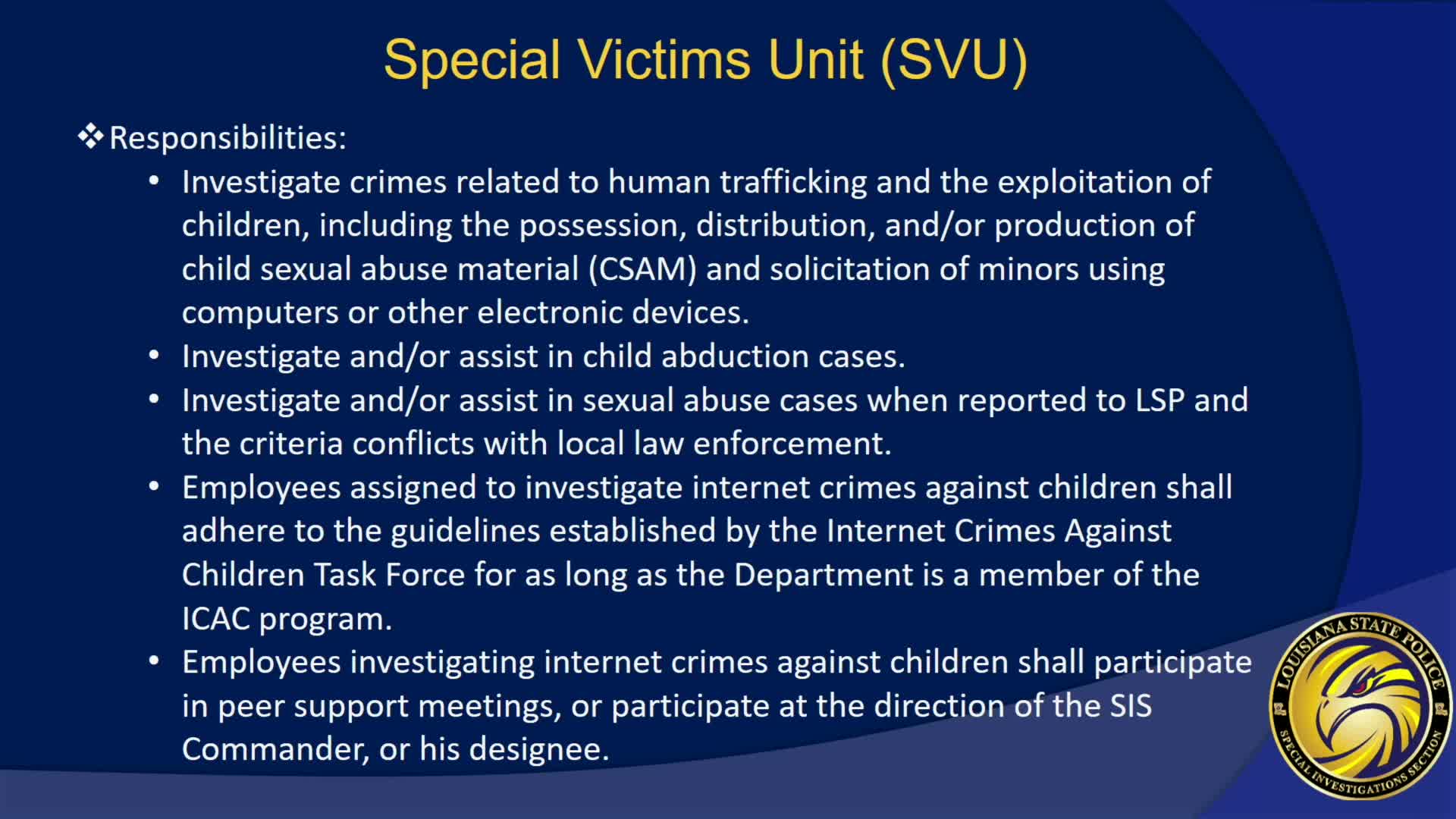State police, AG task force tell lawmakers online child exploitation has risen; urge more staff, tech fixes and parent outreach
Get AI-powered insights, summaries, and transcripts
Subscribe
Summary
State law enforcement officials told a legislative committee that online child exploitation and repeat offending have increased and urged more staffing, technology tools and coordinated outreach to parents and internet companies.
State law enforcement officials told a Louisiana Senate committee on Sept. 6 that they have seen an increase in online child exploitation and repeat offending tied to social media and apps, and they urged more staffing, technology tools and coordinated outreach to parents and internet companies.
Captain Joe Patu of the Louisiana State Police Special Investigation Section introduced Special Victims Unit personnel and investigators who described how many referrals now arrive through the national Internet Crimes Against Children (ICAC) network and tech companies’ reporting tools. “Within the last 2 months, we’ve worked 3 cases … where we have been assigned a case that was a referral through the task force and we find out as we get into the case that this is someone who was already arrested and convicted … and who is reoffending,” Investigator Jordan McDimsey said.
Nut graf: Committee members and law-enforcement presenters said the work depends on both more investigators and improved legal tools. Speakers highlighted gaps between state and federal law around emerging problems such as AI-generated child sexual abuse material (CSAM) and said outreach to internet providers and parents could cut off predator access while prosecutions proceed.
What law enforcement told senators
Special Victims Unit detectives said many of their cases begin with tips routed from social platforms and the National Center for Missing and Exploited Children. “Those companies … are using tools that report these referrals to us,” McDimsey said, adding that the unit works closely with federal partners and that some cases involve registered sex offenders who reoffend online. Captain Patu and Investigator Whitley Jones described human-trafficking referrals coming through DCFS and said many reports lack the indicators that make them actionable; they asked for work to refine referral criteria to reduce unproductive leads.
Christopher Masters, operations commander for the Louisiana Bureau of Investigation’s ICAC task-force effort under the Office of the Attorney General, reviewed statewide numbers and enforcement capacity. “As of Sept. 6 this year, 14,769 tips were received related to the exploitation of children in the state of Louisiana,” Masters said. He also told the committee the statewide ICAC network and partners have produced “over 300 arrests of child predators in the state of Louisiana” and identified more than 60 child victims so far this year.
Legal and technology gaps
Committee members asked whether state statutes match federal tools for prosecuting steps such as attempted trafficking and new problems including AI-generated CSAM. Masters and McDimsey said federal law covers some modern conduct that Louisiana’s criminal code does not, and the panel encouraged lawmakers to consider changes. Investigator McDimsey described federal penalties for AI-generated material and noted that, under some federal statutes, creation of simulated CSAM can be prosecuted even when victims are not real. “In the federal system, you are prosecuted as if and the penalties are the same as if you had completed the act,” a committee member told the witnesses when comparing statutes.
Staffing, training and coordination
Presenters told senators that adding investigators and maintaining trained local partners are critical. McDimsey and Patu said investigators sometimes find people on probation or supervised release who re-offend quickly; they linked that to case outcomes such as charge amendments to lesser offenses that shorten jail time. Masters said ICAC has worked to expand local participation—he described a growth from 8 to 62 partner agencies in recent months—and that his office ties funding and equipment grants to partners’ reporting and performance measures.
Outreach, ISPs and parental controls
The committee heard several times about prevention through education and service-provider cooperation. Masters and Captain Patu supported stronger parent-facing outreach and school-based messaging; Masters offered to provide links to public-facing resources from the National Center for Missing and Exploited Children. Senators and task‑force presenters said internet service providers already offer parental controls and device management tools that could be promoted through schools, utility bills or text-message campaigns. Senator Mizell described using an ISP account to schedule and limit a teenager’s device access and urged scaling that education statewide.
What lawmakers asked for
Committee members pressed witnesses about whether courts and prosecutors are following through, about why some state charges are amended to obscenity, and about coordination with DCFS on referrals. Senators asked for follow-up briefings on (1) differences between state and federal statutes on attempted trafficking and AI-generated CSAM, (2) whether mandatory minimums and federal prosecutions could be used more often, and (3) a planned meeting that the committee will convene with internet-service providers and tech companies to discuss consumer-facing education and product settings.
Ending: Where the work goes next
Witnesses told the committee the trends require both more investigators and more cross‑sector work—education for parents and schools, improved referral filters at DCFS, and legislative changes to address new technology. The committee said it will arrange follow-up meetings with state police, the AG’s ICAC representatives, DCFS, and internet companies to explore next steps.
Quotations in this article come from recorded committee testimony by Captain Joe Patu (Louisiana State Police), Investigator Jordan McDimsey (Louisiana State Police Special Victims Unit) and Christopher Masters (Louisiana Bureau of Investigation / ICAC task force), and are attributed where used.
